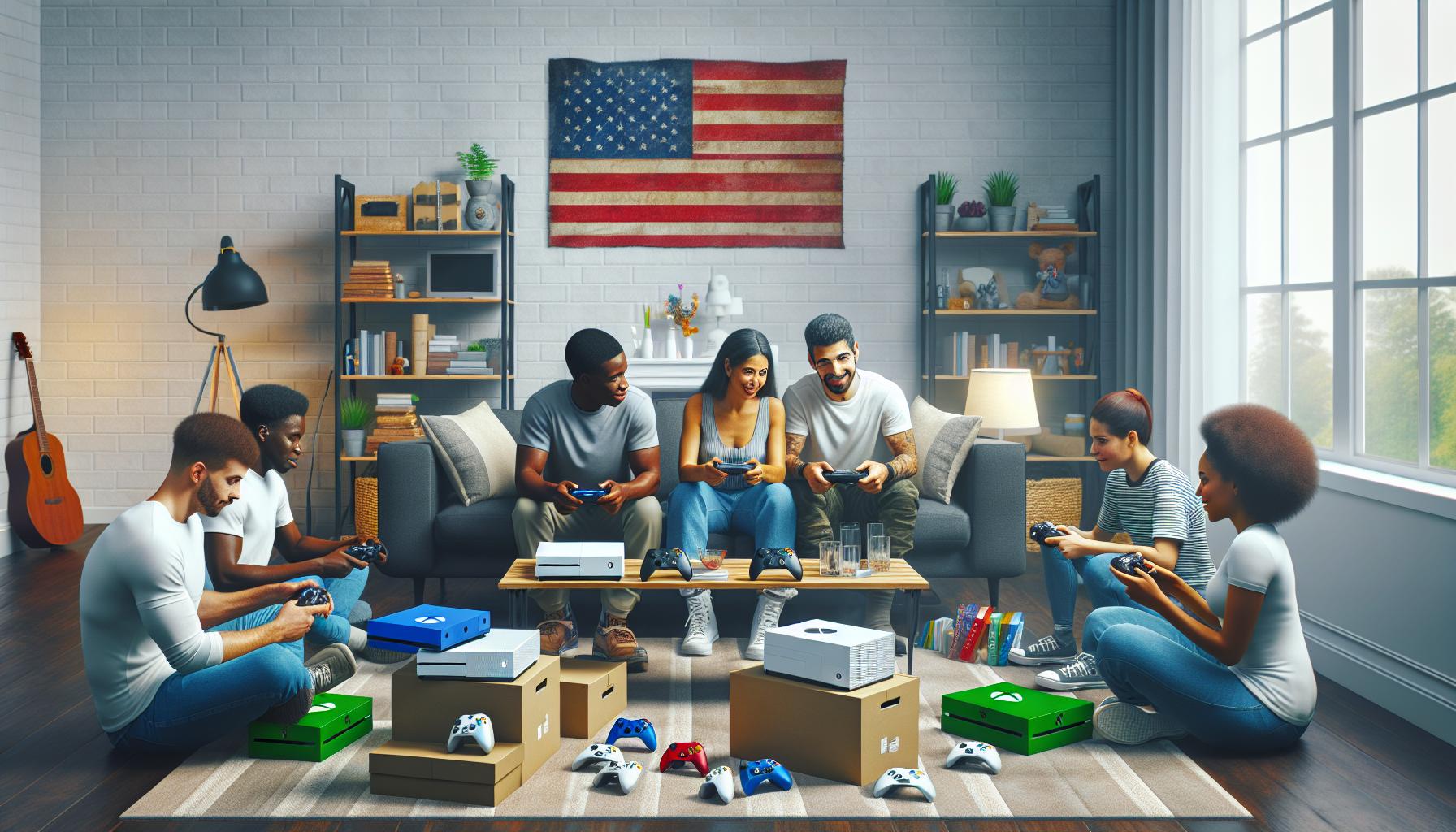As an avid Xbox gamer, I’ve discovered that sharing games across multiple consoles can save money and enhance the gaming experience for family and friends. While Microsoft officially supports game sharing between two consoles, many players wonder if it’s possible to extend this feature to three Xbox One systems.
I’ll walk you through everything you need to know about game sharing on Xbox One, including the official limitations and potential workarounds for sharing your digital library across multiple consoles. Whether you’re trying to share games with family members or looking to maximize your gaming budget, understanding how game sharing works is essential for every Xbox One owner.
Key Takeaways
- Xbox One officially supports game sharing between two consoles through the Home Xbox designation feature
- Digital games can be played simultaneously on two consoles – the Home Xbox (console license) and a secondary console (account license)
- Users are limited to 5 Home Xbox changes per year and can only designate one Home Xbox at a time
- Game sharing beyond two consoles is not officially supported and may violate Microsoft’s Terms of Service
- Account security is crucial when sharing games – enable two-factor authentication and maintain unique passwords
- Digital purchases and subscriptions like Xbox Game Pass can be shared through the Home Xbox system
Xbox One Game Sharing 3 Consoles
Xbox One game sharing operates through a digital license system that enables players to access their game library on different consoles. Here’s a detailed breakdown of the core mechanics and limitations.
How Game Sharing Works
Digital game sharing on Xbox One functions through the Home Xbox designation feature. The system allows digital games to be played simultaneously on two consoles:
- The primary console (Home Xbox) accesses games through the console’s license
- The secondary console accesses games through the account’s license
- Game progress syncs automatically across consoles via cloud saves
- Downloaded content includes games, add-ons & Xbox Game Pass subscriptions
- Each account can designate only one Home Xbox at a time
- Home Xbox changes are limited to 5 times per year
- Digital licenses authenticate through 2 methods:
- Console license: Available to all users on the Home Xbox
- Account license: Tied to the purchasing account on any Xbox
- Offline play requires Home Xbox designation for account-independent access
- DRM checks occur every 24 hours on non-Home consoles
| License Type | Users with Access | Internet Requirement |
|---|---|---|
| Console License | All users on Home Xbox | No |
| Account License | Purchasing account only | Yes |
Setting Up Game Sharing Between Consoles

Setting up game sharing on Xbox One requires configuring specific settings across consoles through a systematic approach. This process involves managing Home Xbox designations and coordinating multiple accounts effectively.
Designating Your Home Xbox
- Press the Xbox button on the controller to open the guide
- Navigate to Profile & system > Settings > General > Personalization
- Select “My home Xbox” from the menu options
- Choose “Make this my home Xbox” to designate the console
Critical points for Home Xbox designation:
- Sign in with the account containing the digital game library
- Confirm the selection when prompted about sharing benefits
- Verify the designation status in system settings
- Monitor remaining Home Xbox changes (maximum 5 per year)
Managing Multiple Accounts
The process for managing accounts across consoles involves:
Primary Console Setup:
- Add family member accounts through system settings
- Configure individual privacy settings for each profile
- Enable password protection for purchases
- Set content restrictions per account
Secondary Console Organization:
- Sign in with the game-owning account
- Download desired games while signed in
- Create separate profiles for other users
- Enable auto-sign-in for convenience
| Console Type | Account Required | Internet Needed | Shared Benefits |
|---|---|---|---|
| Home Xbox | Any Account | No | All Features |
| Secondary | Game Owner | Yes | Games Only |
| Third Console | Game Owner | Yes | Limited Access |
Best Practices for Three-Console Sharing

Managing Xbox One game sharing across three consoles requires careful coordination of account settings, security measures, and purchase strategies. These practices optimize the gaming experience while maintaining account integrity.
Account Security Tips
- Enable two-factor authentication on all Microsoft accounts used for game sharing
- Create unique passwords for each account with 12+ characters including numbers, symbols & letters
- Set parental controls on child accounts to prevent unauthorized purchases
- Log out of inactive console sessions after each gaming period
- Monitor account activity through Microsoft’s security dashboard for suspicious logins
- Update account recovery information monthly to maintain access control
- Store account credentials in a secure password manager instead of browsers
- Buy games from the primary account to maximize sharing potential
- Purchase Xbox Game Pass Ultimate subscriptions on the main sharing account
- Wait for digital game sales to maximize value across shared consoles
- Verify regional pricing differences before making purchases
- Download games during off-peak hours to optimize installation speeds
- Keep 10-15% storage space free on each console for game updates
- Track digital licenses through the Microsoft account purchase history
- Coordinate DLC purchases with shared account members to prevent duplicate buys
These practices focus on securing shared accounts while maximizing the value of digital purchases across multiple consoles. Each guideline addresses specific aspects of maintaining a stable sharing environment.
Common Game Sharing Issues

Xbox One game sharing encounters specific technical challenges that affect access to shared content. Here’s how to address the most frequent issues when sharing games across multiple consoles.
Troubleshooting Connection Problems
Connection issues disrupt game sharing by preventing license verification on secondary consoles. These problems manifest through:
- Checking network status in Xbox settings to verify internet connectivity
- Refreshing game licenses by signing out then back into the Xbox account
- Testing network speed to ensure minimum 3 Mbps download requirements
- Clearing persistent cache by power cycling the console for 30 seconds
- Confirming Xbox Live service status through official Xbox support channels
License Validation Errors
License validation errors occur when the Xbox system cannot verify game ownership properly. Common solutions include:
- Restoring licenses through the “Manage game & add-ons” menu
- Verifying Home Xbox designation in system settings
- Removing then re-downloading game content
- Checking subscription status for Game Pass or EA Play titles
- Confirming purchase history in Microsoft account settings
| Error Code | Issue | Solution |
|---|---|---|
| 0x803F8001 | License sync failure | Restart console |
| 0x803F9006 | Digital ownership error | Restore licenses |
| 0x803F8003 | Content access blocked | Check Home Xbox settings |
| 0x803F9007 | Network validation error | Test network connection |
| 0x803F8006 | Account authentication | Sign in again |
Legal and Policy Considerations
Microsoft’s Terms of Service
The Xbox One game sharing feature operates within Microsoft’s service agreement parameters. The official terms permit sharing digital games between two consoles through the Home Xbox designation. Microsoft’s digital rights management (DRM) system enforces these limitations to protect intellectual property rights while offering flexibility to users.
| Policy Element | Limitation |
|---|---|
| Home Xbox Changes | 5 per year |
| Simultaneous Play | 2 consoles |
| Account Sharing | Household only |
| License Transfers | Non-transferable |
Account Sharing Boundaries
Microsoft’s policies define account sharing boundaries for Xbox One users:
- Share digital content with family members living in the same household
- Use personal accounts for individual purchases
- Maintain exclusive control of account credentials
- Access shared content through authorized methods
Risk Factors
Attempting to extend game sharing beyond two consoles involves several risks:
- Account suspension for violating terms of service
- Loss of digital purchases
- Restricted access to Xbox Live services
- Forfeiture of gaming achievements
- Inability to recover banned account content
Compliance Guidelines
Following these guidelines maintains account compliance:
- Register Home Xbox only on trusted consoles
- Share accounts exclusively with household members
- Purchase games from authorized retailers
- Document digital purchase receipts
- Enable account security features
Regional Restrictions
Digital content sharing varies by region:
- Game availability differs across territories
- Price variations affect purchase options
- Content ratings impact sharing eligibility
- Language support varies by region
- DLC accessibility changes by location
The enforcement of these policies protects both users and content creators while maintaining the Xbox gaming ecosystem’s integrity.
I’ve explored the ins and outs of Xbox One game sharing and its limitations across multiple consoles. While Microsoft officially supports sharing between two consoles there’s no legitimate way to extend this to three systems simultaneously.
To protect your gaming experience and account security I recommend sticking to the official two-console sharing method. By following the guidelines I’ve outlined you’ll be able to maximize your gaming library while staying within Microsoft’s terms of service.
Remember that responsible game sharing not only saves money but also helps maintain a healthy gaming ecosystem for everyone. For the best experience focus on managing your Home Xbox settings wisely and keeping your account secure.



